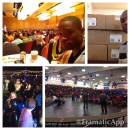What is love?
Is love an emotion or an action? Does it require two people to generate or can one person have it? Why do we crave it?
Dictionary Definition
love [ luv ]
1. feel tender affection for somebody: to feel tender affection for somebody such as a close relative or friend, or for something such as a place, an ideal, or an animal
2. feel desire for somebody: to feel romantic and sexual desire and longing for somebody
1. like something very much: to like something, or like doing, something very much
Jullien’s Definition
Love is the unconditional giving of one’s time and best energy.
Love is an action. It is the action that initiated the Universe—our spiritual source did something it didn’t have to do and created the world and us. Whether the creation happened in 6 days, an instant, or is still happening in this moment, we have been left with the energy of the sun, food, thought, and heart as symbols of our Creator’s love for us.
Love has no expectation. It gives because it wants to give. When expectation occurs, it is a transaction or exchange as opposed to love. If we apply this to our “romantic” relationships where love is supposed to be at its height, it’s rarely the case. Many marriages, even those that weren’t arranged, are arrangements. Early relationships weren’t always based on love—they were based on family, community, work, and wealth. Are we certain that Adam and Eve loved each other or could we consider the first man and first woman an arrangement?
The reason our “romantic” relationships tend to be a strong source of love and space to give love is because we spend more time with our partners than anyone else. But time isn’t the only function—the second half of the equation is giving our best energy. The distinction between energy and our best energy is the distinction that is made between a store-bought gift that has no meaning and a thoughtful gift that specifically fits the individual we’re giving it to.
Energy comes and can be given in many forms:
– Presence: being with someone
– Attention: thinking of someone, even from a distance
– Action: doing for someone
I also like Gary Chapman’s 5 Love Languages which include:
1. Words of Affirmation
2. Quality Time
3. Receiving Gifts
4. Acts of Service
5. Physical Touch
Love requires sacrifice, but not in the sense that we lose ourselves. Love requires sacrifice, in that we put our individual interest behind the interest of the unit, which hopefully creates a greater possibility for all. In order for two wholes to come together, they don’t have to become half of themselves—instead, they just create a greater whole. If we lose ourselves in the practice of love, it isn’t love—that’s tolerance and conformity. Love helps us find ourselves in and through each other—that’s true connection.
When we seek love from a place of need or emptiness rather than wholeness, we can create a symbiotic or co-dependent relationship, but nothing new gets created in that situation, energy is only reallocated. While that can be a good thing, it isn’t love. Love transforms energy to a higher state as suggested by the first law of thermodynamics. But the second law also suggest that entropy or the tendency toward chaos is always present. Love’s energy counters entropy and keep things and people together.
The purest love always starts with self in the same way our Creator created us out pure love. We may think love comes from another person or place, but it actually emerges from within and then connects with the love in others. It is so beautiful when two people decide to give the gift of love to each other at the same time without knowing. It transcends someone giving a gift to someone else because they received a gift from them earlier. Self-love is simply an awareness of our power to:
1. create love
2. give love, and
3. receive love.
Each one of us has had a challenge with one of those three aspects, but a person who is truly in love with themselves can do all three.
To love thy neighbor as thyself implies that we must love ourselves first and that have the capacity to do so. It’s from the well of self-love that we are able to draw from and give love to others. Recognizing the love that has been freely given to us by our Creator through that initial act and emotion of creation is enough love to supply the world. And if we are made in God’s image, we have the powerful to create and initiate similar acts of love.
Love freely!



